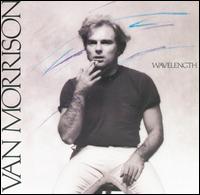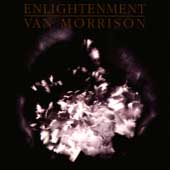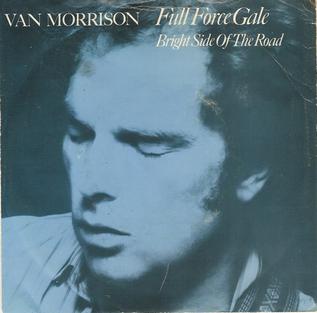
Veedon Fleece is the eighth studio album by Northern Irish singer-songwriter Van Morrison, released on 5 October 1974. Morrison recorded the album shortly after his divorce from wife Janet (Planet) Rigsbee. With his broken marriage in the past, Morrison visited Ireland on holiday for new inspiration, arriving on 20 October 1973. While there he wrote, in less than three weeks, the songs included on the album.

Hard Nose the Highway is the seventh studio album by Northern Irish singer-songwriter Van Morrison, released in 1973. It is his first solo album since his 1967 debut Blowin' Your Mind! to contain songs not written by Morrison. A cover version of the song "Bein' Green", usually associated with Kermit the Frog, is included, as is a take of the traditional song "Purple Heather". The album also contains the single "Warm Love," a fan favourite.

A Period of Transition is the ninth studio album by Northern Irish singer-songwriter Van Morrison, released in 1977. It was his first album in two-and-a-half years. At the time of its release it was received with some disappointment by critics and fans: "Most were hoping for a work of primeval vocal aggression that would challenge the emerging élite of Morrison pretenders, whose ranks included Bruce Springsteen, Bob Seger, Phil Lynott, Graham Parker and Elvis Costello." However, the album is still notable for several major compositions, including "Heavy Connection", "Flamingos Fly", "The Eternal Kansas City" and "Cold Wind in August".

Wavelength is the tenth studio album by Northern Irish singer-songwriter Van Morrison, and was released in the autumn of 1978. The album has a different musical sound from his previous albums, leaning towards a pop rock sound with prominent electric guitars and synthesizers. Wavelength was Morrison's best selling album at the time of the original release. Mick Glossop, Bobby Tench and Peter Bardens were given credit for special assistance in production.

Inarticulate Speech of the Heart is the fourteenth studio album by Northern Irish singer-songwriter Van Morrison, released in 1983. Morrison said he arrived at the title from a Shavian saying: "that idea of communicating with as little articulation as possible, at the same time being emotionally articulate". As his last album for Warner Bros. Records, he decided to do an album which had more than the usual complement of instrumental tracks. As he explained in 1984, "Sometimes when I'm playing something, I'm just sort of humming along with it, and that's got a different vibration than an actual song. So the instrumentals just come from trying to get that form of expression, which is not the same as writing a song." Although not expanded upon, of note is that a special thanks is given to L. Ron Hubbard in the liner notes. The reissued and remastered version of the album contains alternative takes of "Cry for Home" and "Inarticulate Speech of the Heart No. 2".

Beautiful Vision is the thirteenth studio album by Northern Irish singer-songwriter Van Morrison, released in February 1982. It continued Morrison's departure from R&B at the time, instead favoring Celtic folk and American jazz in its music. As with many of Morrison's recordings, spirituality is a major theme and some of the songs are based on the teachings of Alice Bailey. Other songs show Morrison's Celtic heritage and reminiscence of his Belfast background.

Poetic Champions Compose is the seventeenth studio album by Northern Irish singer-songwriter Van Morrison, released in 1987 on Mercury Records. It received generally positive reviews from critics, most of whom viewed it as adequate mood music.

Too Long in Exile is the twenty-second studio album by Northern Irish singer-songwriter Van Morrison. The album was produced by Morrison and draws on urban blues and soul jazz sounds, including collaborations with John Lee Hooker and Georgie Fame. Released in 1993 by Polydor Records, Too Long in Exile received positive reviews from most critics and reached #4 on the UK Albums Chart. It reached #29 in the US, Van Morrison's highest ranking since 1978's Wavelength (#28) and until 1999's Back on Top (#28).

Irish Heartbeat is the eighteenth studio album by Northern Irish singer-songwriter Van Morrison and is a collaboration with the traditional Irish musical group the Chieftains, released in 1988. It was recorded at Windmill Lane Studios in Dublin, Ireland, and reached number 18 in the UK album charts.

Avalon Sunset is the nineteenth studio album by Northern Irish singer-songwriter Van Morrison. It was released in 1989 by Mercury Records to both commercial and critical success. In 2008, Avalon Sunset was reissued and remastered, featuring an alternative take of "Whenever God Shines His Light", and a version of "When the Saints Go Marching In" with additional lyrics by Morrison.

Enlightenment is the twentieth studio album by Northern Irish singer-songwriter Van Morrison. It was released in 1990 and reached No. 5 in the UK charts and "Real Real Gone" charted at No. 18 in Mainstream Rock Tracks.

Hymns to the Silence is the twenty-first studio album by Northern Irish singer-songwriter Van Morrison. It was his first studio double album. Morrison recorded the album in 1990 in Beckington at Wool Hall Studios and in London at Townhouse and Westside Studios.

"Bright Side of the Road" is a song written by Northern Irish singer-songwriter Van Morrison and included on his 1979 album Into the Music. It was also one of the outtakes that made up the 1998 compilation album, The Philosopher's Stone. As a single "Bright Side of the Road" was released in September 1979 and charted at No. 48 in the Netherlands, No. 63 in the UK and just outside the Billboard Hot 100 in the US at No. 110. In 2020, the song reached its highest radio airplay chart position in Ireland, peaking at #2.

"Cleaning Windows" is a song written by the Northern Irish singer-songwriter Van Morrison, recorded on his 1982 album Beautiful Vision.

"Warm Love" is a hit song written by Northern Irish singer-songwriter Van Morrison.
"The Way Young Lovers Do" is a song by Northern Irish singer-songwriter Van Morrison from his second solo album, Astral Weeks. It was recorded in 1968, at Century Sound Studios New York City, during September and October of that year. The song is in triple metre. The distinctive feel of the original recording emerges from the non-rock style of double-bass phrasing by veteran jazzman Richard Davis and additional jazz musician session players, which combined with Morrison's soulful vocals, creates a relatively unusual combination of stylistic elements.
"Astral Weeks" is the title song and opening track on the 1968 album Astral Weeks by Northern Irish singer-songwriter Van Morrison.

"Full Force Gale" is a song written by Northern Irish singer-songwriter Van Morrison. It was included on his 1979 album Into the Music.

"Blue Money" is a song written by Northern Irish singer-songwriter Van Morrison. It was the second of two Top Forty hits from his 1970 album, His Band and the Street Choir, reaching No. 23 on the US chart. The US single featured "Sweet Thing", from the album Astral Weeks, as the B-side. It was released as a single in the UK in June 1971 with a different B-side, "Call Me Up in Dreamland". The song became Morrison's third best selling single of the 1970s, remaining on the charts for three months.

"Ro Ro Rosey" is a song written by Van Morrison that was written and recorded for Bang Records owner and producer Bert Berns and released on his 1967 album Blowin' Your Mind!. It was also released as the follow up single to "Brown Eyed Girl."

















